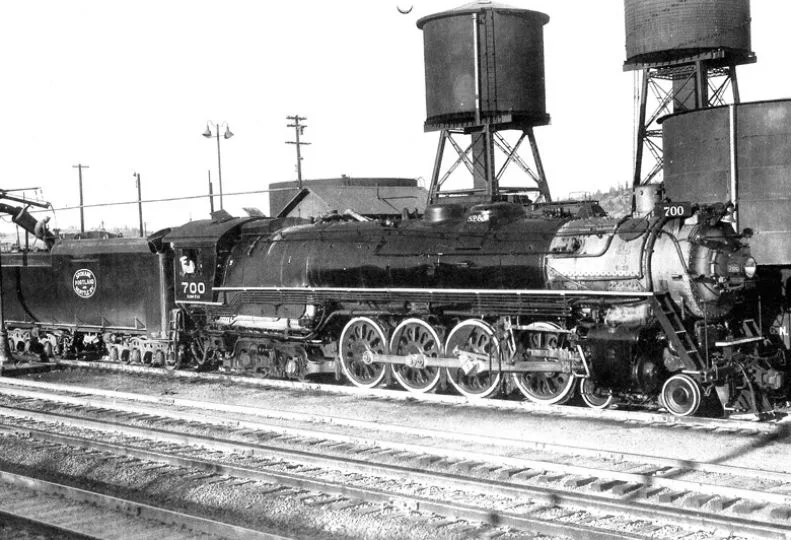
Home » Hillyard rail cleanup plan review due by year-end
Hillyard rail cleanup plan review due by year-end
Recommendations won't affect north-south freeway

November 17, 2016
The Washington state Department of Ecology’s site manager for the Black Tank property in Hillyard says the department expects by the end of the year to submit changes to recommended proposals from two companies charged with removing contaminated oil on the 7-acre site.
Black Tank is directly south of the finished portion of the North Spokane Corridor—and in the path of its proposed extension.
The state Department of Transportation so far has completed about half of the 10.5-mile corridor from the north junction with U.S. 2 at Wandermere south to the Freya Street/Francis Avenue vicinity, at a cost of $615 million.
The Legislature last year approved $750 million in funding to complete the project, continuing from Freya/Francis south to a planned interchange at Interstate 90.
Jeremy Schmidt, Ecology’s site manager for Black Tank, says that location is one of 12,500 contaminated sites in the state. The state agency previously identified current property owner BNSF Railway Co. and former fueling depot operator Marathon Oil, both of Texas, as parties responsible for paying for its cleanup.
“There will be some required modifications we will make to their proposals for cleanup,” Schmidt says. “Our goal is to have those changes to BNSF and Marathon Oil by the end of the year, and then begin to have the public review anywhere from early to the middle of 2017.”
Named after a black refueling tank, BNSF removed the tank in 2006. It wasn’t until 2008 that anyone knew how deep the contamination extends there, says Schmidt.
The former fueling depot site is contaminated with oil floating atop the Spokane Aquifer 170 feet below the surface of the property. The contaminated site doesn’t have to be cleaned up before construction can take place there.
In the meantime, the Washington state Department of Transportation, Spokane city planners, and members of the Greater Hillyard Business Association continue to have meetings about the design and concerns expressed by some businesses and community members about the effect the corridor may have on area neighborhoods.
In August, the Journal reported that Spokane was one of four communities that won an Every Place Counts Design Challenge Grant through the U.S. Department of Transportation.
Every Place Counts is intended to help reconnect communities that are geographically divided by freeways and to help ensure other communities aren’t disconnected similarly.
Greater Hillyard Business Association President Richard Burris wants to see the transportation department construct a portion of the corridor as a modern surface-street system, rather than a freeway.
Burris says he thinks a surface street system through Hillyard would connect more effectively the northeast Spokane community.
While soliciting input from multiple sources, the transportation department will make the final decision as to how the freeway will be constructed.
“We at this time haven’t made an alignment decision,” says Al Gilson, spokesman for the Washington state Department of Transportation’s Eastern Region.
Gilson says there will be no construction related to the North Spokane Corridor until the beginning of next year.
The Legislature’s $750 million approval last year was adjusted for inflation and now is expected to cost state taxpayers $879 million. The entire corridor is scheduled for completion in June 2029, Gilson says.
Next month, bids will go out for construction on the Freya Street structures, which will consist of building the northbound and southbound mainline freeway bridges over Freya, north of Francis between two roundabouts there and a segment of retaining wall adjacent to the BNSF tracks near Francis, Gilson says.
Construction is expected to start by March 2017 and to be completed by March 2018. The cost estimate for that work is $7 million to $12 million.
A smaller project, costing $1 million, will involve local street and sidewalk improvements along Market Street from the Spokane River to Francis in preparation for future grading and construction of the freeway. That project will start and end next spring and is expected to cost $1 million, Gilson says.
As for the freeway’s construction through Hillyard, Burris thinks the corridor ultimately will be elevated as its original design calls for.
“All the parties involved can’t seem to move beyond their particular constraints,” says Burris. “WSDOT has their constraints, Ecology has their constraints, and it’s going to take intervention from Olympia, probably the office of the Governor, the attorney general, to direct their department heads to say, ‘Resolve this issue in the best interest of the taxpayers of the state of Washington and get this done in a timely manner so we can proceed.’”
However, Louis Meuler, a city planner, says starting next year res-idents will have more of an opportunity than ever to offer their input about the freeway, ranging from issues of landscaping to potential concerns for their respective neighborhoods as the freeway approaches.
“As the freeway has now reached the city limits, the Department of Transportation is now really reaching out to all of those public input points.”
But as for how the corridor will be constructed at Black Tank—whether elevated or on the surface—the Ecology department will have nothing to do with that selection. “Ultimately it’s the Department of Transportation’s decision to make,” Schmidt says.
The Black Tank site can be cleaned up whether the corridor project is a raised freeway or a more modern surface street system. However, a surface street system would make the cleanup more costly for BNSF and Marathon, Schmidt says.
“There are ways to do it,” Schmidt says of contamination cleanup. “But because it’s deeper contamination, it’s going to take longer to clean and cost more.”
Latest News Government
Related Articles

_web.webp?t=1769673727)
_web.webp?t=1769673728)
_web.webp?t=1769673735)
